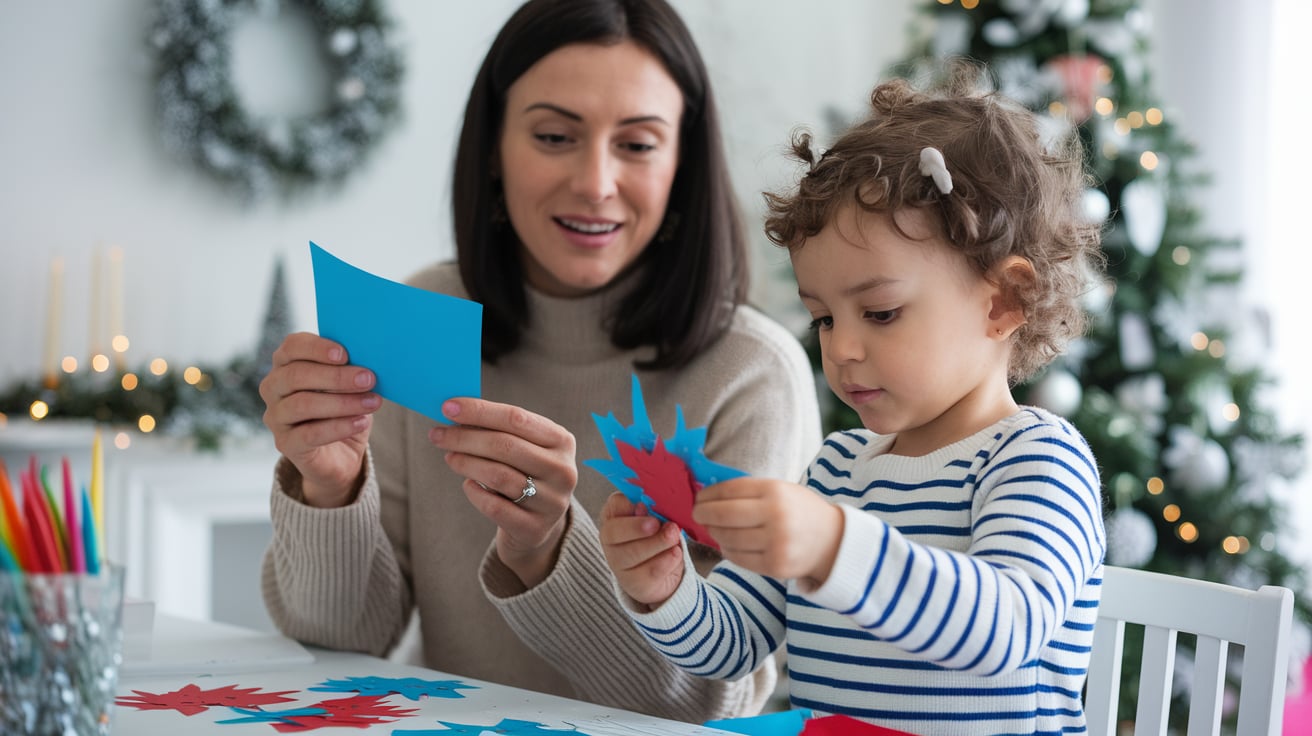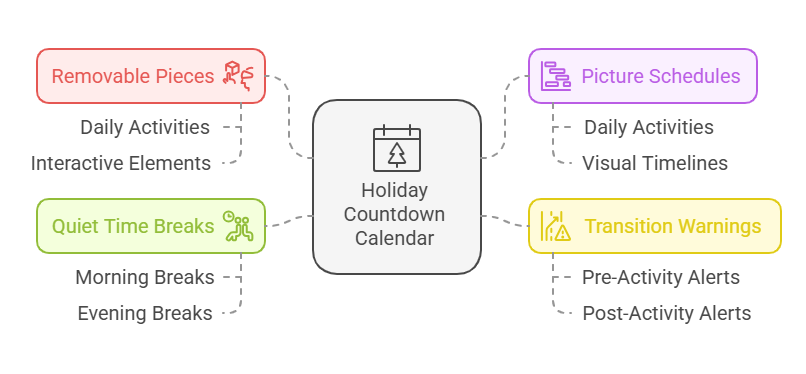While the holiday season brings joy and excitement, it can also be challenging for children with autism who thrive on consistency. Your child may feel anxious or overwhelmed when their usual routines are disrupted by holiday activities, family gatherings, and schedule changes. Creating a structured transition plan can help your child feel more secure and prepared for the festivities ahead.

How to Gradually Introduce Autism-Friendly Holiday Changes
Some effective strategies for easing your child into holiday routines include starting preparations 2-3 weeks before the actual events. You might begin by showing pictures of previous holiday celebrations, practicing holiday-specific activities in small doses, or role-playing social scenarios they’ll encounter. For example, if you’re planning to attend a family dinner, you could practice sitting at the table for gradually increasing periods or try on special occasion clothes in advance.
Tips for Using Visual Schedules During the Holidays
- Create a holiday countdown calendar with removable pieces
- Use picture schedules showing daily holiday activities
- Include transition warnings in your visual timeline
- Mark quiet time breaks clearly on the schedule
Visual supports serve as powerful tools for helping your child understand and prepare for holiday changes. Recognizing the importance of clear visual communication can significantly reduce anxiety and improve participation in holiday activities.
Factors to Consider When Adjusting Routines
- Monitor your child’s energy levels throughout events
- Plan around peak performance times
- Consider sensory triggers in new environments
- Maintain important bedtime routines
For instance, if your child typically gets overwhelmed in the late afternoon, schedule important holiday activities earlier in the day when they’re more likely to be successful. Keep core elements of their regular routine intact, such as mealtimes and bedtime procedures, even during special occasions. After carefully observing your child’s responses to changes, you’ll be better equipped to make adjustments that support their needs while still enjoying holiday traditions.
Key Takeaways:
- Creating a sensory-safe environment is necessary – like setting up a quiet room at grandma’s house with noise-canceling headphones and familiar toys, giving your child a personal retreat space when holiday gatherings become overwhelming.
- Maintaining predictable routines during celebrations helps reduce anxiety – for example, giving your child a 2-3 day notice before family gatherings and using visual calendars to mark upcoming holiday events makes transitions easier to handle.
- Family education and communication plays a vital role – sharing specific examples with relatives about what works (quiet, gentle approaches) versus what doesn’t (loud excited voices when trying to calm your child) helps create an understanding and supportive holiday environment for everyone.
Maintain Routines
Clearly, maintaining consistent routines during the holiday season is vital for children with autism to feel secure and regulated. As highlighted in Preparing for Christmas with Autistic Children: A Guide for Families, predictable schedules help reduce anxiety and provide stability during this exciting but potentially overwhelming time. You’ll want to preserve your child’s daily rhythm while thoughtfully incorporating festive activities.
How-to: Keep Core Routines Consistent
Assuming you want to maintain stability during the holidays, focus on protecting these vital routines:
- Morning routines – Keep wake-up times and breakfast schedules consistent
- Bedtime rituals – Maintain regular evening wind-down activities
- Meal schedules – Try to serve meals at usual times
- Therapy sessions – Continue attending regular appointments
Knowing that consistency breeds comfort will help guide your holiday planning.
Tips for Balancing Festivities with Daily Structure
With thoughtful planning, you can weave holiday activities into your established routines:
- Visual schedules – Update daily charts to show special activities
- Time blocks – Designate specific periods for celebrations
- Transition warnings – Give clear notice before schedule changes
- Quiet time – Maintain regular breaks and downtime
Knowing how to blend structure with celebration helps create joyful experiences.
Core elements that support your child’s routine stability include:
- Environmental consistency – Keep main living spaces familiar
- Sensory considerations – Maintain preferred lighting and sound levels
- Social boundaries – Respect usual interaction preferences
- Communication methods – Use established systems consistently
Knowing these foundations helps maintain balance during festivities.
Factors That Help Maintain Stability
For optimal success in maintaining routines, consider these key elements:
- Family cooperation – Ensure all members understand importance of routines
- Advance planning – Schedule holiday activities thoughtfully
- Flexibility options – Have backup plans ready
- Support systems – Keep regular helpers involved
Though changes are inevitable, maintaining core stability helps everyone enjoy the season.
To enhance routine maintenance during holidays, implement these strategies:
- Regular check-ins – Monitor your child’s stress levels
- Adaptive scheduling – Adjust plans based on responses
- Environmental controls – Maintain familiar spaces
- Communication tools – Keep usual systems in place
Though festivities bring change, your child’s comfort remains the priority.
Create a Retreat Space for Sensory Breaks
Not all holiday celebrations need to be high-energy affairs. Creating a designated quiet space for your child can make the difference between an enjoyable celebration and an overwhelming experience. This personal retreat allows your child to step away from intense holiday stimulation and find comfort in a controlled environment when feeling overwhelmed.

How-to: Design a Calming Sensory Space
Retreat spaces should be thoughtfully designed with your child’s specific needs in mind. Choose a quiet corner or separate room away from the main festivities, and ensure it’s easily accessible. Your retreat space might include:
- Soft lighting options like dimmer switches or battery-operated candles
- Comfortable seating such as bean bags or weighted blankets
- Sound-dampening elements like thick curtains or carpeting
- Visual barriers to reduce outside distractions
After setting up the space, practice using it with your child before the holiday events begin.
Tips for Stocking the Space with Comfort Items
How-to create a personalized comfort kit for your retreat space:
- Sensory toys like fidget spinners or stress balls
- Noise-canceling headphones for audio control
- Favorite books or quiet activities
- Comfort objects from home
After observing which items provide the most comfort, you can adjust the selection accordingly.
Sensory considerations for your retreat space should include:
- Texture variety in cushions and blankets
- Calming scents if your child enjoys aromatherapy
- Temperature control options
- Personal items that provide security
After establishing the space, maintain it as a consistent safe haven throughout the holiday season.
Factors to Consider for Autism-Friendly Routine Adjustments
Sensory needs vary greatly among children with autism. Consider these necessary elements:
- Light sensitivity levels and preferred lighting types
- Sound tolerance and noise reduction needs
- Touch preferences for different textures
- Space requirements for movement or stillness
Recognizing your child’s unique sensory profile will help you create the most effective retreat space.
Breaks from holiday stimulation are necessary for maintaining emotional balance. Consider these additional factors:
- Time limits for optimal break duration
- Transition signals for entering and leaving the space
- Privacy needs and supervision balance
- Emotional cues indicating need for breaks
Recognizing these patterns will help you support your child’s self-regulation during holiday celebrations.
Helping Family and Friends Support Your Child
Now that the holiday season approaches, it’s imperative to create a support network that understands and embraces your child’s unique needs. Your extended family and friends can become powerful allies in making celebrations more enjoyable when they understand how to interact with and support your child with autism. Building a circle of understanding supporters can transform holiday gatherings from potentially stressful situations into meaningful celebrations.
Educating Family and Friends About Autism-Friendly Holidays
You can start by sharing simple, practical information about autism with your family members and friends. Consider creating a brief guide or having one-on-one conversations about your child’s specific needs, triggers, and coping strategies. Personal examples often work best – like explaining how your child might need to wear noise-canceling headphones during gift opening time or may prefer to eat in a quieter room.
Tips for Setting Boundaries and Expectations
- Clear communication about your child’s limits and needs
- Advance notice about potential changes or challenges
- Specific guidelines for interaction and support
- Flexible timing for participation in activities
Family gatherings can be overwhelming, but with proper preparation and communication, they can become manageable and enjoyable. Recognizing the importance of setting clear boundaries helps everyone feel more comfortable and confident during holiday celebrations.
It’s helpful to remember that most relatives want to help but might not know how. Creating a supportive environment requires patience and ongoing dialogue. Recognizing that each family member may need time to adjust and learn is key to maintaining positive relationships.
Factors That Encourage Understanding and Patience
- Regular updates about your child’s progress
- Sharing success stories and positive moments
- Educational resources about autism
- Involvement opportunities in your child’s interests
Patience and persistence are imperative when building understanding among family members and friends. Consistent communication and gentle guidance can help create a network of support that benefits everyone involved. Though the journey may have its challenges, building a strong support system is worth the effort.
Incorporating Sensory-Friendly Activities
After years of experience working with children on the autism spectrum, it’s clear that sensory-friendly activities can transform holiday celebrations from overwhelming to enjoyable. During the festive season, you can create meaningful experiences by carefully selecting activities that align with your child’s sensory preferences and comfort levels. Whether it’s crafting with specific textures or engaging in quiet play zones, these thoughtfully chosen activities can help your child feel more connected to the holiday spirit.
How-to: Choose Activities That Suit Your Child’s Needs
Your child’s unique sensory profile should guide your activity selection. Consider activities that provide controlled sensory input and allow your child to participate at their own pace. For example, if your child enjoys tactile experiences, you might set up a holiday-themed sensory bin with pine cones, smooth ornaments, and soft artificial snow. If they’re sensitive to noise, you could create a quiet craft corner for making paper snowflakes or decorating cookies.
Tips for Adapting Traditional Holiday Games
- Modify volume levels for musical activities
- Create visual schedules for game sequences
- Include movement breaks between activities
- Offer sensory tools during game time
This adaptation process is vital for maintaining your child’s comfort while participating in holiday traditions. You can transform classic games by incorporating visual supports, adjusting lighting, or modifying rules to match your child’s processing speed and sensory preferences. After making these thoughtful modifications, you’ll often see increased participation and enjoyment.
Factors to Consider for Sensory Overload
- Light sensitivity – adjust brightness and flashing decorations
- Sound levels – monitor background music and crowd noise
- Texture tolerance – consider comfortable seating and clothing
- Space requirements – ensure adequate personal space
Plus, understanding these environmental factors helps you create a more supportive holiday atmosphere. When planning your celebration, consider incorporating quiet zones, sensory breaks, and calming activities throughout the event schedule. The key is to maintain a balance between festive excitement and sensory comfort for your child.
Using Social Scripts to Boost Confidence
To help your child navigate holiday celebrations with greater confidence and reduced anxiety, social scripts can be invaluable tools. These personalized narratives provide a clear roadmap for social interactions, making unfamiliar situations more manageable and predictable for your child. By breaking down complex social scenarios into simple, step-by-step sequences, you’re giving your child the gift of preparedness and self-assurance during holiday gatherings.
How-to: Create and Practice Social Scripts
Now that you’re ready to develop social scripts, start by identifying specific holiday situations that might challenge your child. Create simple, clear narratives using pictures and simple sentences that describe what will happen and how to respond. For example, “When family arrives, I can say ‘Hello’ and give a high-five if I want to.” Practice these scripts regularly in a calm, familiar environment before the actual events.
Tips for Role-Playing Holiday Scenarios
- Use familiar toys to act out scenarios
- Practice common greetings and responses
- Include visual supports and gestures
- Incorporate comfort items into the practice sessions
- Review escape plans if things become overwhelming
Holiday gatherings can be more manageable when you incorporate regular practice sessions into your daily routine. Role-playing helps your child build confidence while learning appropriate social responses in a safe, supportive environment. Thou shall see improvement as your child becomes more comfortable with these practiced scenarios.
Factors That Enhance Communication Skills
- Create a consistent routine for practice
- Use positive reinforcement during sessions
- Incorporate special interests into scripts
- Practice non-verbal cues and body language
- Include sensory breaks in your scripts
Role Playing becomes more effective when you tailor it to your child’s specific needs and interests. Consider incorporating their favorite characters or activities into the scripts, making the learning process more engaging and meaningful. Thou shall find that personalized approaches yield the best results in developing social confidence.
Involve Your Child in Preparations
Unlike passive participation, actively involving your child with autism in holiday preparations can create meaningful experiences and reduce anxiety about upcoming changes. By making them an integral part of the process, you’re not only building excitement but also providing opportunities for sensory exploration and skill development in a controlled, familiar environment.
How-to: Assign Age-Appropriate Tasks
Some excellent ways to include your child in holiday preparations include:
- Having them sort decorations by color or size
- Letting them arrange ornaments on lower tree branches
- Helping with simple baking tasks like mixing ingredients
- Creating handmade decorations using preferred materials
Assume that each child’s abilities and interests will guide their level of involvement.
Tips for Making Preparations Fun and Engaging
Clearly, the key to successful involvement lies in making the experience enjoyable and manageable:
- Break tasks into small, manageable steps
- Use visual schedules to outline the preparation process
- Incorporate their special interests into holiday activities
- Provide sensory-friendly tools and materials
Assume that flexibility and patience will be your best allies in this process.
Making the preparation process more accessible can transform potentially overwhelming activities into opportunities for growth:
- Create quiet zones for breaks during activities
- Use timer systems to manage activity duration
- Offer choice boards for selecting tasks
- Implement reward systems for completed activities
Assume that each small success builds confidence for future participation.
Factors That Foster Independence and Pride
Tasks that promote independence and create a sense of accomplishment are imperative:
- Encourage decision-making in decoration choices
- Celebrate completed tasks with specific praise
- Document their contributions through photos
- Create traditions around their preferred activities
Thou shall see their confidence grow with each successful contribution.
A positive approach to holiday preparation can transform challenges into opportunities:
- Build social skills through collaborative activities
- Develop motor skills through hands-on tasks
- Enhance communication through activity-based interactions
- Strengthen family bonds through shared experiences
Thou shall witness remarkable growth through thoughtful involvement.
Adjusting Plans With Patience and Understanding
Many parents of children with autism know that holiday celebrations rarely go exactly as planned. Your child’s comfort and well-being should always come first, which means being ready to adapt and modify traditional holiday activities. Understanding that celebrations might look different from what you initially envisioned is key to creating meaningful experiences that work for your whole family.
How-to: Stay Flexible with Holiday Plans
The key to successful holiday celebrations lies in your ability to remain adaptable. When you notice your child showing signs of sensory overload or anxiety, be prepared to adjust your plans immediately. For example, if a large family gathering becomes overwhelming, you might need to move to a quieter room or head home earlier than planned. Remember that a shorter, positive experience is better than a longer, stressful one.
Tips for Managing Expectations and Stress
- Create a backup plan for each holiday activity
- Keep familiar comfort items readily available
- Establish clear exit strategies for overwhelming situations
- Set up a quiet space at gathering locations
- Though challenges may arise, focus on celebrating small victories
Stay positive and remember that your child’s needs may vary from day to day. Creating a supportive environment means being ready to adjust expectations at any moment while maintaining a calm and understanding attitude. This flexibility allows both you and your child to enjoy holiday celebrations in a way that feels comfortable and meaningful.
Factors That Promote a Positive Experience
- Maintain consistent routines when possible
- Include sensory-friendly activities
- Provide structured transitions between activities
- Create visual schedules for events
- The key is finding balance between tradition and accommodation
Managing holiday experiences successfully requires a delicate balance of planning and flexibility. When you prioritize your child’s comfort while maintaining some holiday traditions, you create opportunities for genuine joy and connection. Remember that there’s no “right way” to celebrate – what matters most is creating meaningful moments that work for your family.
Decorating with Sensory Considerations
All holiday decorating decisions should be made with your child’s unique sensory profile in mind, as highlighted in Preparing for the Holidays: A Guide for Parents of Children with Autism. Creating a sensory-friendly environment means carefully selecting decorations that won’t overwhelm your child while still maintaining the festive spirit.
How-to: Choose Decorations That Are Sensory-Friendly
While selecting holiday decorations, consider these sensory-friendly options:
- Soft, diffused lighting instead of bright, flashing lights
- Unscented or naturally scented decorations
- Touchable textures that your child enjoys
- Non-musical ornaments or those with volume control
Assume that each decoration choice will impact your child’s comfort level.
Tips for Involving Your Child in Decorating
One effective way to make decorating meaningful is through careful planning and involvement:
- Create a visual schedule for decorating activities
- Let your child choose their favorite decorations
- Take frequent breaks during decorating sessions
- Establish a quiet zone for sensory breaks
Assume that your child’s participation will vary day by day.
With thoughtful preparation, you can make decorating an enjoyable experience:
- Use social stories to explain decorating activities
- Practice handling decorations beforehand
- Set realistic expectations for participation
- Celebrate small victories along the way
Assume that flexibility will be key to success.
Factors to Avoid Overstimulation
Your decorating strategy should include careful consideration of potential triggers:
- Avoid excessive glitter or reflective surfaces
- Limit motion-activated decorations
- Reduce crowded displays in small spaces
- Monitor sound levels from musical decorations
Thou shall prioritize your child’s comfort over traditional decorating expectations.
Avoid overwhelming your space with too many decorations at once:
- Introduce decorations gradually over time
- Remove overwhelming items immediately
- Create clear pathways through decorated areas
- Maintain familiar elements in your home
Thou shall always put your child’s needs first when decorating.
Encouraging Social Interaction at Their Pace
For children with autism, holiday social interactions can feel overwhelming, but with thoughtful planning and support, you can help your child navigate these experiences successfully. Creating structured social opportunities that align with your child’s comfort level allows them to participate meaningfully in holiday celebrations while feeling safe and supported. Your understanding of their unique social preferences and sensory needs will help guide the way they connect with family and friends during festive gatherings.
How-to: Support Your Child in Social Settings
Social gatherings during holidays require careful preparation and ongoing support. You can help your child by establishing clear expectations and providing them with tools to manage social situations. Consider using social stories to preview holiday events, practice greetings, or role-play common social scenarios they might encounter. Your presence as a steady support system can help them feel more confident in navigating these social situations.
Tips for Facilitating Positive Interactions
An effective approach to supporting social interaction involves creating opportunities that match your child’s interests and comfort level. Consider these vital strategies:
- Scheduled breaks between social activities
- Visual schedules to preview social events
- Quiet zones for decompression
- Familiar faces in small groups first
Understanding the importance of gradual exposure to social situations can help your child build confidence over time. Any successful interaction, no matter how small, deserves celebration and recognition.
Factors That Build Confidence in Social Situations
To help your child develop social confidence during holiday gatherings, consider these key elements:
- Predictable environments with minimal surprises
- Consistent routines throughout social events
- Positive reinforcement for social attempts
- Comfort items readily available
With the right support and understanding from family members, your child can experience meaningful social connections during holiday celebrations. Perceiving your child’s social progress as a journey rather than a destination helps create a more supportive and understanding environment for everyone involved.
Reflecting on the Holiday Experience
After implementing various strategies from Creating an Autism-Friendly Holiday: Strategies for a Joyful Season, it’s necessary to take time to reflect on your family’s holiday experience. Your observations and insights will help create even more meaningful celebrations in the future. Taking notes about what brought joy and comfort to your child, as well as noting any challenging moments, can serve as valuable guidance for upcoming festivities.
How-to: Discuss What Worked and What Didn’t
Clearly documenting your holiday experience while it’s fresh in your mind can provide invaluable insights. Consider keeping a simple journal or using your phone’s notes app to record specific situations, both positive and challenging. For example, if your child particularly enjoyed opening presents in a quiet room rather than amid family chaos, or if certain holiday foods were more appealing than others, these details matter for future planning.
Tips for Learning and Improving for Next Year
- Review sensory triggers and successful coping strategies
- Document successful activities and timing of events
- Note family members’ helpful accommodations
- Track dietary preferences and food successes
Learning from each holiday experience helps you build a more comprehensive understanding of your child’s needs. The key is to focus on both achievements and areas for improvement.
It’s worth noting that holiday traditions can evolve to better suit your family’s needs. Your observations might reveal that morning celebrations work better than evening ones, or that smaller gatherings create more enjoyable experiences. The goal is to create celebrations that work for everyone.
Factors That Help You Celebrate Progress
- Positive behavioral changes during festivities
- New coping skills demonstrated
- Social interactions successfully navigated
- Family adaptations that proved helpful
Experience shows that celebrating even small victories can boost everyone’s confidence. Whether it’s your child trying a new holiday food or successfully participating in a family tradition, these moments deserve recognition. Your child’s progress might include better communication during gatherings or increased tolerance for holiday activities. Recognizing these achievements helps build confidence for future celebrations.
FAQ
Q: How early should I start preparing my autistic child for holiday celebrations?
A: Start preparation at least 2-3 weeks before any major holiday event. For instance, in our family, we begin creating a visual calendar marking important dates, and we practice holiday-related activities gradually. Last year, I introduced my son to Christmas decorations by letting him touch and explore one ornament each day, which helped him feel comfortable with the changes in our home environment.
Q: What should I do if my child becomes overwhelmed during a holiday gathering?
A: Having a pre-planned escape strategy is imperative. For example, when we visit my sister’s house for holiday dinners, we’ve designated her guest bedroom as our “quiet zone.” I keep my son’s favorite weighted blanket, noise-canceling headphones, and familiar toys there. When he starts showing signs of overwhelm – like covering his ears or becoming agitated – we take a 15-20 minute break in this space.
Q: How can I help relatives understand my child’s sensory needs during holiday celebrations?
A: Share specific examples and clear guidelines with family members. In our case, I created a simple one-page guide explaining that sudden loud noises, like holiday crackers or surprise gift reveals, can be distressing. I suggested alternatives, such as gentle gift presentations and keeping background music at a lower volume. This helped our family create more inclusive celebrations.
Q: What are some autism-friendly holiday activities that can become meaningful traditions?
A: Focus on activities that align with your child’s interests and comfort level. My son loves patterns and organization, so we created a tradition where he arranges holiday lights by color. Another family I know has their child sort ornaments by size and shape before decorating. These activities become both meaningful and educational while respecting sensory preferences.
Q: How can I make holiday meals more manageable for my autistic child?
A: Create a comfortable dining experience by planning ahead. At our holiday meals, I always bring my son’s preferred plate and utensils from home. We also have an agreement with family that he can eat his main dish first (his familiar food) before trying any new holiday dishes. This approach has helped reduce anxiety around holiday meals and gradually increased his willingness to try new foods.



